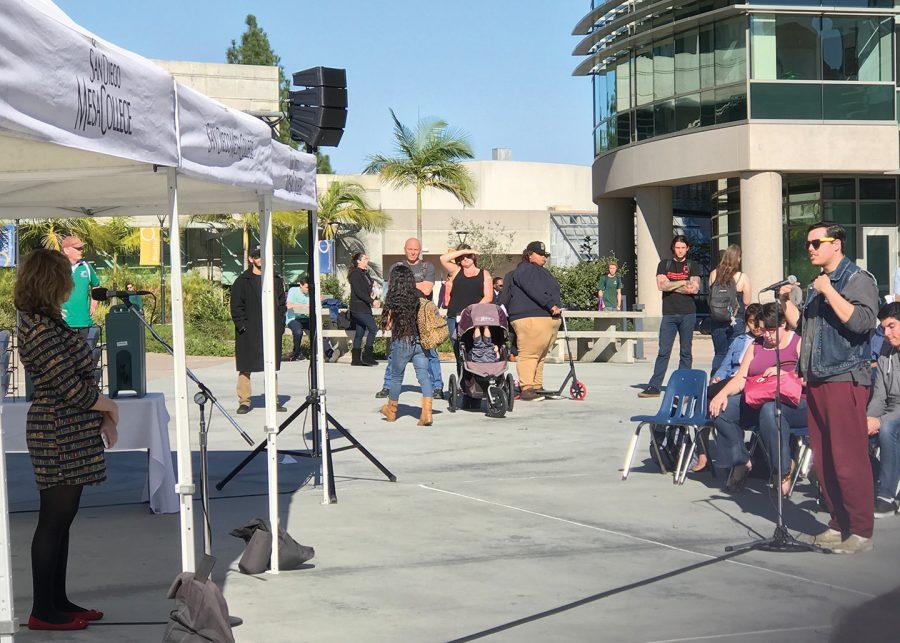In a political climate of anxiety and confusion, Mesa professors dug into their disciplines to explain the recent election to students at a “teach-in” on Nov. 30. Lecturers from a range of departments took turns at a microphone set up in front of the Learning Resource Center and shared with an audience of about 60 students and faculty members the wisdom they’d gleaned from their own fields of study.
Gloria Kim, history professor, spoke out against the suggestion of listing Muslims in a registry. “That chips away at what people are fighting for overseas,” she said.
Psychology professor Inna Kanevsky also warned against the dangers of ‘othering,’ though she focused more on the discrimination that a Trump-voter may face in academia. “We always see ‘us’ and ‘them’ and that’s natural… it’s an effort to see otherwise,” she explained, citing an experiment in which children pitted against one another in competition quickly arrived at a mutual and full-fledged hatred. She added that these groups of ‘us’ and ‘them’ rarely seek each other’s point of view, contributing to the surprise that many liberals felt at Trump’s win.
As evidence, she pointed to another study: in this one, participants engaged in a group conversation, where some people agreed with them and others disagreed. Researchers tracked the gaze of subjects and found that they tended to focus their eyes on those people who agreed with them, avoiding looking at the people with whom they disagreed. Kanevsky related this to the social media practice of unfriending someone whose political views differ from one’s own, resulting in an echo chamber of a newsfeed. To avoid this kind of confirmation bias, Kanevsky suggested using the research methods that we practice in school to trace online claims to their sources.
Professor Evan Adelson from the sociology department also spoke about why Trump won the election, attributing the upset in large part to a reaction to neoliberalism, which has formed the basis of our country’s economic policies for the last three decades, whether under Democrat or Republican presidencies. Neoliberalism values private markets over public programs and aims to reduce the role of government. Adelson pointed out that, while these policies primarily aid business profits, they have been cleverly tied to personal freedoms in the minds of Americans.
These economic decisions have resulted in tremendous income inequality; our country has greater wealth disparity than any other affluent nation. Thanks to suicide and drug and alcohol use associated with inequality, white men without a college education are experiencing decreasing life spans for the first time in recent history. Adelson argued that the reason that Trump received so many of these votes was that white men want someone who will part from this traditional economic view. “The rising tide does not lift all boats anymore,” Adelson said.
Michelle Rodriguez, political science professor, spoke on the powers and limitations of the executive branch, pointing out that both the Paris Climate Change Agreement and the Deferred Action on Childhood Arrivals program, enacted by President Obama, will be vulnerable under a new president.
The final speaker of the event was professor Sheldon Deckelbaum from the dramatic arts department. He spoke about the theatrical tools employed by both politicians and activists during this election cycle. “Remember that whoever wins the story wins the battle,” he said, positing that Trump’s story of a populist millionaire was particularly compelling. He urged students to remember that as the rules of political discourse change, it is important to use our imaginations to supply interesting rhetorical devices, rather than giving in to blunt rage.
Following Deckelbaum’s talk was an open-forum for students.
The idea for this event was proposed by professor Joe Safdie from the English department. He worked with Rob Fremland, chemistry professor, and the student government to put it together. They hope that it will become a regular campus event in the future.

